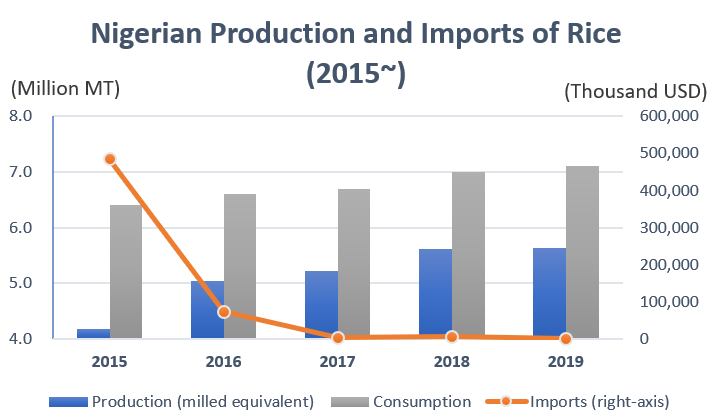Nigeria Paves New Opportunities with the Upcoming Completion of Third-Largest Rice Mill
In collaboration with other states such as Kwara and Sokoto, Lagos, the Nigerian city with the largest population on the African continent, is set to complete construction on the biggest rice mill in sub-Saharan Africa. The mill is also the third-largest in the world, expected to process 32 MT of rice per hour and more than 125K tons of rice annually once the building is completed in the first quarter of 2021.
Nigeria's Struggle with Producing Rice Domestically
Rice is a highly consumed staple in Nigeria with a per capita consumption of 32kg, approximately 7.1 million MT in total for MY 2019/20. Despite this, Nigeria is having trouble meeting domestic demand. The country's average yield is a little over 2MT per ha, half of that of the global average. In fact, over 80% of the locally produced rice is from small-scale processors that have a processing capacity below 100 MT and are subject to only a limited range of equipment due to financial difficulties. This combined with inefficient processing technologies has resulted in the country producing rice that is both more expensive and of lower quality than other major rice producers such as China and Vietnam. There are also problems with getting consistent quality and fragmentation of the supply chain that is hindering the growth of the industry.

Data Source: ITC Trade Map, FAOSTAT
As the government made it its goal to become completely self-sufficient in rice production since 2015, it subsequently banned rice imports through land borders and placed a 70% tariff on port imports of rice, as well as banning the use of foreign exchange to pay for rice imports and backing loans of at least USD 130 million to help smallholders.Additionally, after Nigeria became one of the last nations to sign the African Continental Free Trade Area Agreement (AFCTA), the country closed off its borders in August 2019 in order to deter food smuggling of products such as rice.
These efforts, however, are largely regarded as being a failure as a supply shortage led to a substantial increase in Nigerian food prices, which according to the National Bureau of Statistics (NBS) reached all-time record of 18.3%, and inflation levels rose to a three-year high of 14.9%. Prices of 50kg bags of rice nearly doubled in Lagos after the border closures at NGN 24,000 (USD 63.12) compared to July prices, and not considerably less than the monthly minimum wage of NGN 30,000 (USD 78.90). Understandably, the border closures are not perceived to have achieved the intended goal of increased production of domestic food supplies, but rather spurred food insecurity that has sometimes even lead to assaults on farmers.
A Step Toward Self-Sufficiency
The construction of the mill is part of Nigeria’s goal of trying to tackle the quality and price issues and reach self-sufficiency as the completion of the mill will be a step toward relying mostly on domestic productions of processed rice. With the establishment, the Rice Famers Association of Nigeria (RIFAN) is optimistic in achieving this goal, stating the country’s use of the areas earmarked for rice production, 11.4K to 17.1K ha, will also aid in decreasing foreign dependency for the continent’s largest rice producer.
Sources
- USDA. "Grain and Feed Annual 2019."
- ITC Trade Map, HS Code 1006Rice
- FAOSTAT,Rice, paddy (rice milled equivalent)
- Reuters. "A growing problem: Nigerian rice farmers fall short after borders close."
- The Africa Report. "Nigeria: President Buhari opens land border at Seme, Illela, Maigatari, and Mfun."
- The Cable. "Lagos multi-billion naira rice mill nears completion."
- The Conversation. "The quality of Nigerian home-grown rice is poor: here’s why."
- Retail brief Africa. "Sub-Saharan Africa’s largest rice mill to be complete in Q1 2021."